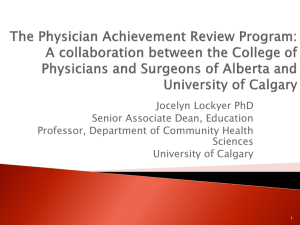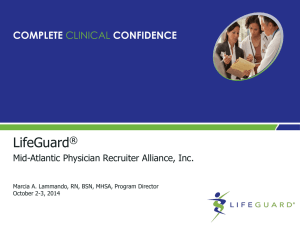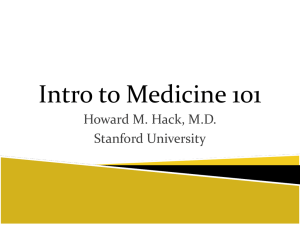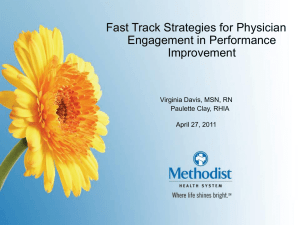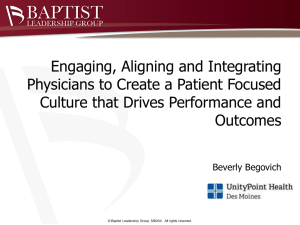Toxic Tail - Hilliard - Poe - Smith - Insurance Managers Association
advertisement
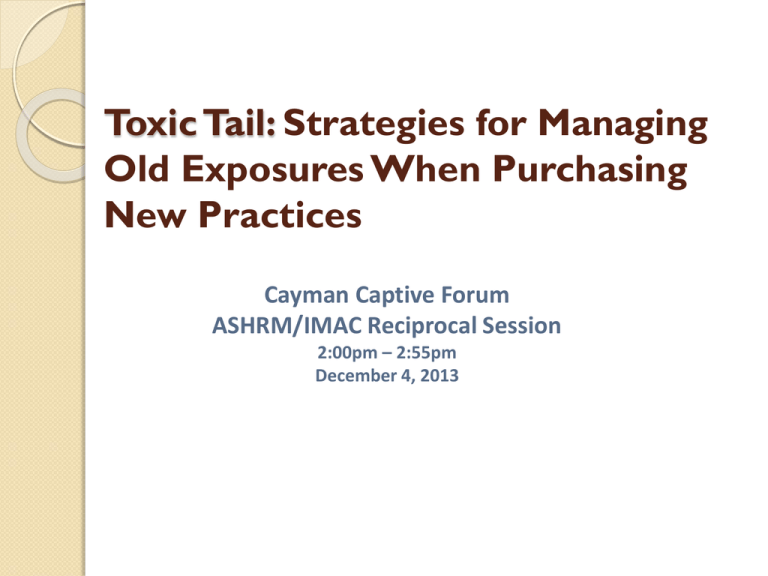
Toxic Tail: Strategies for Managing Old Exposures When Purchasing New Practices Cayman Captive Forum ASHRM/IMAC Reciprocal Session 2:00pm – 2:55pm December 4, 2013 Disclosure We have no potential conflicts of interest to disclose Mary Anne Hilliard, Children’s National, Washington DC Larry Smith, MedStar Health Disclosure I would like to disclose the following relationship(s): Mike Poe, Towers Watson Actuary I have agreed to present the material in a fair and unbiased manner. Introduction of Speakers/Panel & Topics Introductions: Mary Anne Hilliard, Children’s National, Washington DC Larry Smith, MedStar Health Mike Poe, Towers Watson Topics: What are the risk financing options? What are the risks and issues around “prior acts” exposures? How do we address or manage these? Background Health care reform has and will continue to require alignment with physicians: Bundled payments Quality Patient care delivery model – medical home Increase in employment Strong affiliations where employment not allowed The issues and costs of the “prior acts coverage” for physicians can be significant Issues arise because of the predominance of claims made coverage Increase in Physician Employment 2013 Aon Benchmark Non-University hospital systems are increasingly employing physicians, and employing surgeons faster than other specialties. Hospitalists are the fastest growing specialty at community hospitals. Surgeons per 100 Acute Care Beds Average Distribution of Specialties (Non University) 16 Anesthesiology 14 12 Pediatrics 10 General Surgery 8 All Other Surgeons 6 4 Em ergency Medicine 2 OB/GYN Surgery 0 2006 2007 2008 2009 2010 Physicians (Non-Surgeons) per 100 Acute Care Beds Internal Med / Fam Practice / Hospitalist Other Non-Surgical Specialties 60 50 40 30 20 10 0 2006 2007 2008 2009 2010 2013 Aon Benchmark Study Employed Physicians and Cost Savings Our study found that a majority of hospitals systems self-insure the primary layer of coverage for their employed physicians. Bringing the physicians into the risk financing program does appear to have cost savings compared to leaving them in the commercial market due to joint defense and reducing frictional costs. Employed Physician Loss Rates How Employed Physicians are Insured for Primary Layer Coverage $20,000 $18,000 $16,000 3% Em ployed Physician $14,000 Self-insured 24% $12,000 Com m ercially Insured $10,000 Class 1 Com m ercial Prem ium (40% Discount) $8,000 Com bination of selfinsurance and com m ecial coverage $6,000 Class 1 Com m ercial Prem ium (Manual) $4,000 $2,000 $0 2007 2008 2009 Accident Year 2010 2013 Aon Benchmark Study 73% To Be Updated Employed Physicians Claims Made Considerations – Prior Acts and Tail Coverage The overwhelming majority of programs provide claims made coverage for employed physicians Rarely do hospital systems provide prior Acts coverage to employed physicians, however, a majority are providing Tail coverage. Potential exists to have multiple arrangements with physicians as these benefits are typically negotiated. Can be administratively burdensome and lead to underfunding if promised benefits are not accurately tracked. Provide Prior Acts Coverage to Employed Physicians? Provide Tail Liability Coverage to Employed Physicians? 10% Yes, in m any or all instances 7% 29% 4% Yes, in m any or all instances Yes, but only in selected instances Yes, but only in selected instances Never Never 64% 86% 2013Benchmark Aon Benchmark 2013 Aon 2013 Aon StudyStudy What are the Risk Financing Options? The hospital assumes the prior acts exposure in their captive or self insurance program Physician buys a tail policy from the current commercial insurer Hospital funds the purchase of the “prior acts” for the physician Hospital partners with commercial insurer to provide “prior acts coverage” for the physician upon employment In addressing each of the options, our panel will focus on the issues of Exposures, Risk Management, Claims, and Financing A LT E R N AT I V E # 1 What Are The Exposures, Risk Management, Claims, Financing Issues And Implications When The Health Care System Assumes The Prior Acts Exposure In Its Captive Or Self Insurance Program? Panel Discussion ALTERNATIVE # 1 Exposures: We often have an understanding of the risks and exposures when the physicians have had a strong association with the hospital majority of physicians’ practice at your hospital credentialing history claims experience where physician and hospital named in the same suit Medical malpractice may be the main focus of evaluation – but what about the other exposures of the professional corporation and its employees? Current coverage form and status of current insurer Potential from compensable events which have not been reported How do we address the exposures of physicians with whom we have not had a strong affiliation? ALTERNATIVE # 1 Risk Management Implications: What pre-employment strategies do we initiate to better understand the exposures? Risk management assessment of the practice? Is there a hospital policy on the assumption of prior acts? Are we treating all physicians the same? Is there an underwriting application and process in place? Are CMS and other quality indicators and practice patterns considered? What is the interphase between risk management and the credentials process? Use of independent underwriters Orientation to hospitals’ risk management program ALTERNATIVE # 1 Underwriting and risk evaluation process should include the following: Application Interface with credentials process and quality indicators Complete loss history Complete practice history (i.e., location of previous practice activities) Specialty (are you really going to insure an OB tail?) Rating plan/actuarial input Goal is to minimize chance of large claims reported after tail inception date Highlights need for full and complete reporting to the previous carrier Review incident/PCE reports to confirm notice provided More complicated if carrier has a “demand” trigger If so, gain understanding of incidents/PCEs for which no demand has been received ALTERNATIVE # 1 Claims Management Implications: Thorough review of all past claims Consent to settle as an employee vs. prior insurer Is the physician’s consent to settle even required? Joint defense of claims Do you have sufficient systems and claims professionals to handle the claims? ALTERNATIVE # 1 How are “prior acts” claims going to be managed? What if they arise from acts outside your hospital system? What limits of liability for prior acts will the system provide? $1M/$3M or full program limits? ALTERNATIVE # 1 Costs and Risk Financing Implications: Prior acts coverage can be very expensive regardless of who pays for it 150%–250% of mature claims-made premium Many physicians cannot afford or haven’t planned for this cost How does this cost factor into the “Fair Market Value” of the transaction? Business case for employing physicians vs. cost If you pay for “Prior Acts,” do you also provide “Tail” when physician leaves? 1099 – revenue recognition of the value of prior acts for the physician? ALTERNATIVE # 1 This is third party business: Is it diminimis? Taxes, Excise, UBIT, Self Procurement Conduct of insurance business in violation of state laws? Can I use a trust? Do I need a front? Doing business on shore for an off-shore captive Allocation between “third party” vs. “my party” business Potential difference between tail coverage factors for commercial carriers versus true cost If rigorous reporting to prior carrier, true cost may be closer to 110%-150% of the respective annual mature claims-made premium ALTERNATIVE # 1 Captives probably are most cost effective alternative & have the greatest flexibility Proper review and analysis has yielded success for a number of programs Rigorous reporting to prior carrier Lower overhead Risk margin Investment income You are in control Key is understanding and mitigating risk before assuming it A LT E R N AT I V E # 2 The Physician Buys Own “Prior Acts” Coverage From Current Insurer. Sounds Easy And Issues Go Away? Panel Discussion ALTERNATIVE # 2 Risk Management Implications: We still need to conduct our due diligence of the physician and practice to include an assessment of exposures, risk management practices, and claims for us to understand the risk we are assuming on a going forward basis We need to underwrite the exposures we are adding to our program We need to orient the physician to our risk management and claims protocol, risk financing programs, allocation of costs, and other requirements ALTERNATIVE # 2 Claims Management Implications: Transfers tail liability risk to commercial market Physician comes into self-insurance program clean What are the limits purchased and who is the carrier? Does the hospital system weigh in? Are there exposures to the hospital if the physician is under-insured for his tail liability? Financial strength of the commercial insurer/RRG? A LT E R N AT I V E # 3 Health Care System Funds The “Prior Acts” For The Physician Panel Discussion ALTERNATIVE # 3 Risk Management Implications: We still need to conduct our due diligence in understanding the exposures, and risk management issues and have a good understanding of the claims But under this alternative: Loss of control of “prior acts” claims – no joint defense Need to issue a 1099 “Fair market value” of the transaction needs to be considered What are the contractual obligation of either party if the physician leaves? Any pay back provision? Do you provide “tail” coverage for the employment period? ALTERNATIVE # 3 Risk Financing Implications: Pros: Loan serves as “Golden Handcuffs” during term of the loan Simple to administer Cons: Greatest up-front cost for the health care system of any option Can reduce the amount of money available to purchase assets and fund salary (Tail cost part of fair market value) Physician is “free” to leave the health care system at end of 5 years with no tail liability Employment agreement must address: Pre-employment tail liability arrangement Insurance coverage during employment Post employment insurance consequences Fair market value issues Personal income tax issues for the physician ALTERNATIVE # 3 What are the limits purchased and who is the carrier: Does the hospital system weigh in? Financing the tail premium is a major factor in the employment deal Significant expense for the health care system Impact on fair market value for the practice Impact on the physician’s income from the transaction There is a one-time cost for the health care system, but future risk exposure is minimal ALTERNATIVE # 3 Claims Management Implications: Pros: Transfers tail liability risk to commercial market Physician comes into self-insurance program clean A LT E R N AT I V E # 4 Health Care System Partners With A Commercial Insurer To Provide “Prior Acts” Coverage For The Physician Upon Employment Panel Discussion ALTERNATIVE # 4 Risk Financing Implications: Commercial Options: Current insurer of the physician Your current insurance partners Other commercial stand-alone programs: Alterra, Lloyd’s, Med Pro, One Beacon, Ironshore, Cooperative of American Physician RRG, and others Portfolio transfers for programs if large physician group is involved Other flexible arrangements and partnerships with a commercial insurer Who is paying the bill? ALTERNATIVE # 4 Pros: No upfront tail cost No tail cost at time of transaction, therefore increases potential portion of “sale price” physician can realize as income Cons: Portion of first 4 years premium for the $1M claims-made policy is imputed income to physician. Complicated to administer Complicated to understand Do we need to establish a reserve on the financials of the captive to account for the “new” employment related tail liability we would be accruing? How does a health care system deal with the tail liability when a physician leaves employment? Remember a portion of it is the health care system’s tail exposure by that time. ALTERNATIVE # 4 Claims Management Implications: Control of claims/joint defense Flexibility to change insurers (reinsurers) Denial of coverage? Pros: Commercial carrier responsible for physician’s “prior-acts” coverage and claimshandling Cons: First $1M of coverage is being provided by commercial company for pure premium – health care system gets no benefit from positive claims experience First $1M of each health care system employment related claim not within our control Very complicated to administer (first $1M=commercial coverage; remainder of health care system’s SIR, then excess) Difficult to allocate insurance related responsibility for any large claim (i.e., physician and health care systems named in claim – who pays what could be contested) Do you need approval from excess carriers? Conclusion “Please utilize outside legal and tax counsel, run it by your auditor, and work closely with your broker and actuary.”

